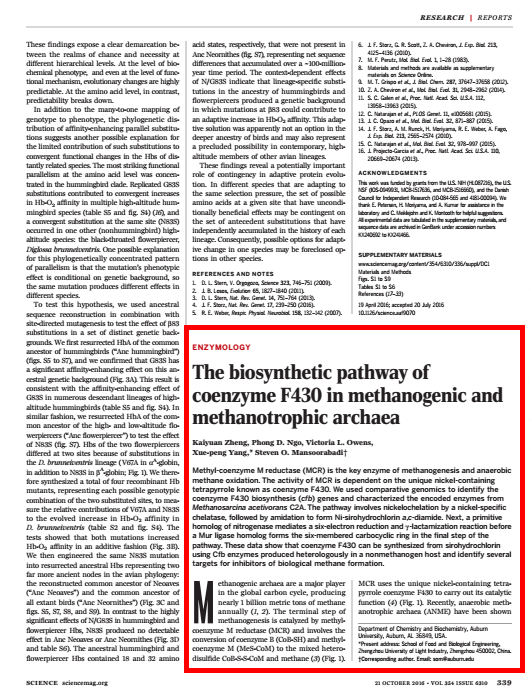| [栏目图片] |
SciencePublishes the Thesis Coauthored by Assist Professor Yang Xuepeng |
|||
|
|
|||
|
|||
|
Science published a thesis titled The biosynthetic pathway of coenzyme F430 in methanogenic and methanothophic archaea, which was an achievement of a joint research between Yang Xuepeng, assistant Professor of the School of Food and Biotical Engineering of ZZUL and the research team led by professor Steven Mansoorabadi of the College of Chemistry and Biochemistry of Auburn University.Thearticle published on Oct. 21 is the first time for ZZULI teachers to show up in Science, the most authoritative journal of the world in the field of science. The paper reveals the synthetic route of methane archaea coenzyme F430. Methanogen is a kind of microorganism produced in the process of biomass-degrading and receiving electrons in the end of electron transfer, which plays an important role in the global carbon cycle. Methane can be used as bio-energy, however, it is also an important factor in climate warming as a large amount of methane is produced from wetlands and rice fields. It is an important issue for scientists all the world around to effectively control this carbon cycle path so that we can make use of it as a kind of energy without damaging the environment. The last step of the redox reaction in the synthetic methane pathway is considered as an important control node and the structure, function and catalytic mechanism of the MCR enzyme in this step are regarded as the hard nut to crack in this field. This study, a part of this joint research is of great scientific significance because it explainsthe biosynthesis mechanism of MCR enzyme coenzyme F430, which locates a breakthrough pointincontrollingmethane inthis carbon cycle path by drug. It takes 4 years for the research team led by Professor Steven to get the nut cracked at last. Assistant Professor Yang Xuepeng’s contributionmainly lies in the work of the cloning and expression of five genes in F430 biosynthetic pathway, isolated and purified the active enzyme protein, and confirmed the first step reaction in the synthetic pathway. The judges of Sciencehighly praised the team’s work by saying that “The last enzymatic step of microbial methanogenesis, and the first step of microbial methane oxidation, relies on the nickel-containing tetrapyrrole coenzyme F430. The successful metabolic engineering of any organism to enzymatically consume methane thus also needs the appropriate machinery to synthesize this compound. Using comparative genomics, Zheng et al. identified several candidate genes responsible for coenzyme F430 biosynthesis. Cloning and expression of all the subsequent proteins in Escherichia coli confirmed the complete in vitro conversion of sirohydrochlorin into mature F430”. Mr. Yang,an outstanding yang researcher of ZZULI in the field of fermentation engineering, biological catalysis and transformation.In recent years, he has completed many projects from the National Natural Science Fund and published a number of theses in journals of world top level. |
|
Copyright © 2014 Zhengzhou University of Light Industry, China. All Rights Reserved. Add: No.136 Ke Xue Avenue,Zhengzhou,HenanProvince,PRC. Zip Code:450000 It is recommended that you use IE7 and above version of the browser to visit the web site. |
